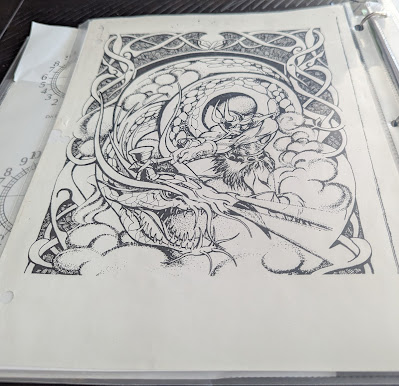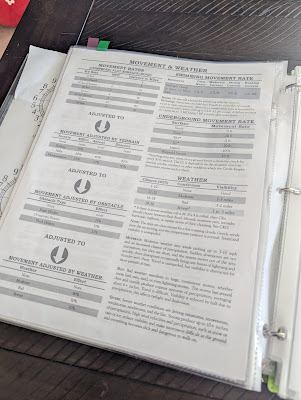My daughter (KamciazArt) drew up a picture of the NPC halfling wizard in our Castles & Crusades game. Stats below!
November 30, 2025
September 6, 2025
Playing Cards for Dynamic Initiative
Castles & Crusades uses dynamic initiative. Each round, the individual players and the Castle Keeper roll a d10 and people take turns from highest result to lowest.
At home, I use tiles on the top of my GM screen to organize and display the order for each round. While displaying the order is handy, the process slows the game down.
Here's what I did:
- I set aside one full suit (ace to king) to be used to determine order. Naturally, I used Spades.
- I set aside one full suit (ace to king) to be used to track order. I used a red suit (Hearts, I believe).
- Each round, I shuffled the Spades and dolled them out to the players to determine who went first. The players kept their cards out in front of them, so it was pretty easy to see who was up.
- I stacked the Hearts from high to low and used them to keep track of where we were.
- After that, we repeated this each round.
How This is Different than Savage Worlds Initiative (and likely other games)
- Savage Worlds has a whole system based on using the deck of cards for initiative. I'm just replacing dice rolls.
- I don't use a whole deck of cards, only 13 from one suit.
- This eliminates ties (which can also slow down play, albeit not dramatically).
- I use a second set of 13 from one suit has a initiative tracker for myself.
September 2, 2025
My Dungeon Master Tool Kit - My Dungeon Master Binder: Part 4 - Encounters
The Encounters section is not for the "core" module/adventure, but rather sandbox resources. These are random tables and other tools to help me figure out what happens to the party when they're traveling on the road or wilderness.
As always, a cover page with some inspirational art. For this one, it's "Flight" by Jeff Fairbourn (heads up - some of his stuff is NSFW/weird).
I'm running a Haunted Highlands campaign, so I have a printout of its own random encounters section.
I have a few things from James Mishler Games. He has shifted his focus to ShadowDark completely, so these Castles & Crusades ones are no longer available. That's a shame, because they're useful.
I also have a few official ones by Troll Lord Games, which are also unfortunately unavailable.
Castles & Crusades - Encounters: Bands of Orcs
Next up - Treasure!
July 8, 2025
My Dungeon Master Tool Kit - My Dungeon Master Binder: Part 3 - NPCs
Counter intuitively, the one key thing I do not have in my NPC section is a list of ready-to-go names. Why? Because:
- I have names from the C&C Castle Keeper Screen in the Combat Section, and
- I use Knave 2e for a ton of random tables (Knave 2e is an excellent toolbox for any D&D-ish game).
Another useful NPC source: Castles & Crusades NPC Almanac Sketches. While I didn't print it out for my binder (it's freaking large), this is a great resource worth having. Like most C&C material, it's easily usable with any D&D-related game (particularly those in the OSR).
Okay, so what do I actually have in the binder?
Well, a touch of art of course. This one is by the ever-reliable Vigil Finlay.

- Namely, the Six Sages and...

- ... People to Meet.

And then last, but not least a few gems by Azukail Games. This fellow cranks out a ton of reasonably priced and useful random tables. These aren't bare bones tables. They give a bit of detail to get your Dungeon Master mind following. He makes things for just about every system you can think of and, if that isn't enough, many are system agnostic.
In my binder, I have:
Here is an example:Next up - Encounters!
June 28, 2025
My Dungeon Master Tool Kit - My Dungeon Master Binder: Part 2 - COMBAT
Continuing my posts about my Dungeon Master binder, I'll start with the first section: "Combat." The section could just as easily be labeled "Rules," but, for me, it's the combat stuff I need to have at the ready.
Let's take a tour of my Combat section...
Page 1: Badass Conan art by Travis Charest
Page 2: One of my favorite D&D art pics - Thor by Jim Rosolof from the 1e AD&D Deities & Demigods.
Next, I have my critical hit and miss tables, namely “Great Hits & Terrible Misses” from Crusader Journal #7 by Jeffrey P. Talanian (who now has his own excellent RPG, Hyperborea). While made for C&C, they would work fine with any D&D-style system.
Then I have my cheat sheets. This includes homemade sheets that I made using Marq (Canva would also work well). Obviously, good ol' Word or Google Docs would probably be fine, but Marq made it easier to rearrange tables, etc.
I also have the official Castles & Crusades table sheets that came with the Reforged Kickstarter.
Then, to cap it off, I have pages from the Castles & Crusades Castle Keeper Screen. Most systems have printable versions of their GM screens on DriveThruRPG, so those are a great source of pages like this.
Next post, I'll go over my NPC section. Stay tuned!
June 20, 2025
My Dungeon Master Tool Kit - My Dungeon Master Binder: Part 1
It's been a while. Time to come back out of the shadows for a it.
Let's chat about a quintessential part of the DM's toolbox - the Dungeon Master binder. For other DM kit stuff, see my other posts about my Dungeon Tool Kit. I said that Part 6 was the final... but I lied.
 |
| If you don't get this reference, we can't be friends. |
Now, if you're one of my eight fans out there, you might be saying, "Wait, Double D, didn't you already write about a DM notebook (Rocketbook)?" And I would say, "Nay, my dear plebeian. That notebook serves a different function: namely prep notes and in-game notes." A DM binder is a storehouse of useful materials meant for use at the table.
 |
| I can't believe I found an image that explains that there are different types of tables. |
After a lot of trial and error, I've whittled my binder's contents down to four key sections.
- Combat: Handy rule reference sheets, mainly for combat.
- NPCs: NPC resources, such as summaries of frequently encountered NPCs and tables for working up NPCs on the fly.
- Encounters: Random encounter tables, short encounter write-ups, and ready to go monster stats.
- Treasure - Treasure tables for cool loot and such. These are things you don't find in your Game Master guide of choice.
I will detail what I have in each of these sections in upcoming posts. To start, I'm going to focus on the actual physical binder that I use.
So let's get into it.
My current binder of choice is this expandable binder. I'm assuming that a lot of my fellow gamers are office supply nerds like me (and if I'm wrong, don't shatter my dreams). As such, you'll appreciate this.
Here is the pre-nerdified Amazon photo.
Here is the post nerdified version in action.
Quick note: I found the cool "Hack n' Slash" graphic from Reddit and it was made by CastleGrief. This dude needs to start making shirts and stickers.
Okay. So why this binder? Well, because it's expandable. I apparently have a thing for things that grow in size. It isn't overly bulky like a traditional hardback binder, but isn't limp like a soft binder (insert joke about DD liking it hard here).
Other things that I find useful:
- Print out all the good stuff you have from DriveThruRPG and put it in your binder.
- Get to your good stuff fast. Also handy for your hardcopy RPG books.
- Sounds like something dirty.
- Not a big fan of plastic? Use these for your printouts.
- Punch them holes, bitch.
March 2, 2025
Resources for Converting D&D to Castles & Crusades (Repost)
 |
| Convert or else! |
Troll Lord Games, the makers of C&C, have an official guide for converting from 5e:
The Crusader's Companion - Peter J. Schroeder compiled a ton of great gamer-created C&C rules into this impressive tome and it is just awesome. It includes a lot of d20 SRD monsters, items, spells, etc. that aren't in the C&C core rules. Also, the Castle Keepering chapter has a Conversion section that provides tables and charts to help you convert D&D materials from other editions into C&C (as well as Pathfinder).
The Castle Keepers Guide - While it doesn't deal with conversion specifically, it does include rules for Skills and Advantages (aka Feats) that might make converting 3.0 or 3.5 D&D to C&C easier.
March 1, 2025
Free Compact Character Sheet & Template
November 13, 2024
Castles & Crusades Rules Reference Sheets
October 14, 2024
My Castles & Crusades House Rules: Part 6 - Miscellany & Weirdness
.jpg) |
| "DMing the Planes" by Cory Trego-Erdner |
- Only dice rolled on the table count. If a die hits the floor, it will be re-rolled.
- Cocked die rolls are re-rolled.
Gnomish Healing Brandy
Rationale:
 |
- By the book, potions of cure light wounds (a.k.a. potions of healing) go for 300 gp a pop. That is a bit pricey for low-level PCs, but I like how C&C keeps magic a bit rare and didn't want to mess with that. Gnomish Healing Brandy was my answer; a good dose of healing for a reasonable cost, but with some side-effects. It should be suitable for any D&D-style game.
Cost:
- 50 gp
- Note: price may vary by availability and how willing the gnome brewer is to sell to non-humans
Description:
- An amber liquor that smells richly of honey and blackberries. It tastes overly sweet, but it is light and easy going down the hatch. The brandy is usually bottled in a drinking gourd. The recipe is a closely guarded secret.
Effect:
- Heals 1d6 HP, but the character must make a constitution save (CL 0) or suffer -1 to hit and -1 to AC for 1d4 rounds due to the extreme buzz.
- A flask contains one dose and multiple doses can be taken (1 per round). However, a save must be made for each dose and the effects are cumulative.
- For example, a character that took two doses would make a save for each dose and, if both saves failed, the character would suffer -2 to hit and -2 to AC.
- The CK may rule that failed saves result in other ill effects (e.g., troubling casting spells, penalties to dexterity or charisma checks, etc.)
- The character must be conscious or, at the least, at 0 HP to take a dose.
by Jeff Rients (also available in Fight On! Issue #4)
- These tables are now ubiquitous, but you gotta love the original.
- Please see Jeff's blog for the details! - Party Like It's 999
On Being Turned to Stone compliments of Jonathan Drain
- A character turned to stone can attempt to strike a heroic pose in order to make a better looking statue. If sold, his statue fetches 100 gp times the result of a Charisma check.




































.png)





